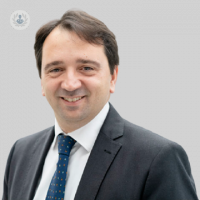What is an echocardiogram, and what do you need one for?
Written by:If you have a heart problem, or one is suspected, it's possible your doctor may request an echocardiogram be performed. But what exactly is an echocardiogram, and what can it detect? Professor Giovanni Di Salvo, leading expert in cardiology and echocardiograms, explains more about the procedure.
What is an echocardiogram?
An echocardiogram, or echo, is a test that uses sound waves at a high pitch (ultrasound) as a means of checking the heart, with an instrument called a transducer. As the sound waves hit different parts of the heart, and bounce back, the transducer detects them. The echoes are transformed into pictures on a screen, so the heart can be visualised.

What does an echocardiogram look for?
There are different types of echocardiograms, and they can check many different things, such as the heart valves, and how well they are working, or to look for the cause of an enlarged heart, chest pain, and irregular heartbeat. Echocardiograms can also detect diseases affecting the heart muscle, and look for tumours in the heart. They measure the heart and its chambers, to see if there is any irregularity, and see if the chambers are pumping blood correctly.
Echocardiograms can also be used with artificial heart valves, to check if they are working as they should and to monitor after surgery.
What is the procedure for an echocardiogram?
As there are different types of echocardiograms, there is not just one procedure. The most common type of echocardiogram is a TTE, or transthoracic echocardiogram. In this procedure, the transducer is used on the chest or abdomen to produce a clear view of the heart.
A Doppler echocardiogram measures the movement of the blood in the heart, and how it flows through the valves and chambers. It can test direction, speed, and how regular blood flow is. This can be done at the same time as a TTE.
A doctor may wish to see how your heart performs under stress – for this, they will use a stress echocardiogram. A special medicine that makes your heart beat faster can be injected, or the test can be conducted after exercise. This will show the blood flow to the heart and if it is regular or low.
In another type of test (TEE, or transesophageal echocardiogram), the probe is inserted down the oesophagus and delivers clearer pictures from there, as it is closer to the heart. For other procedures, no anaesthetic is needed, but a local one is used during a TEE to make you feel more comfortable.
How long does an echocardiogram take?
The most common tests do not take too long and can usually be done as a day case, as it takes around 30 minutes to an hour. This is the same for a stress echocardiogram, although they usually take closer to an hour.
A TEE is a longer procedure, sometimes taking up to two hours. This is because anaesthetic must be administered, and the probe must be inserted carefully. You may experience a slight sore throat or discomfort for a while afterwards.
When can you see the results of an echocardiogram?
This depends on who is performing the test. Usually the results are available a day or so later, but if the test is performed by a cardiologist, you may be able to see the results immediately afterwards. You can then see the results of the echocardiogram with your doctor or specialist, who will discuss anything that they have found with you, and its implications.
To book an appointment with Professor Giovanni Di Salvo, just head on over to his Top Doctors profile today.


